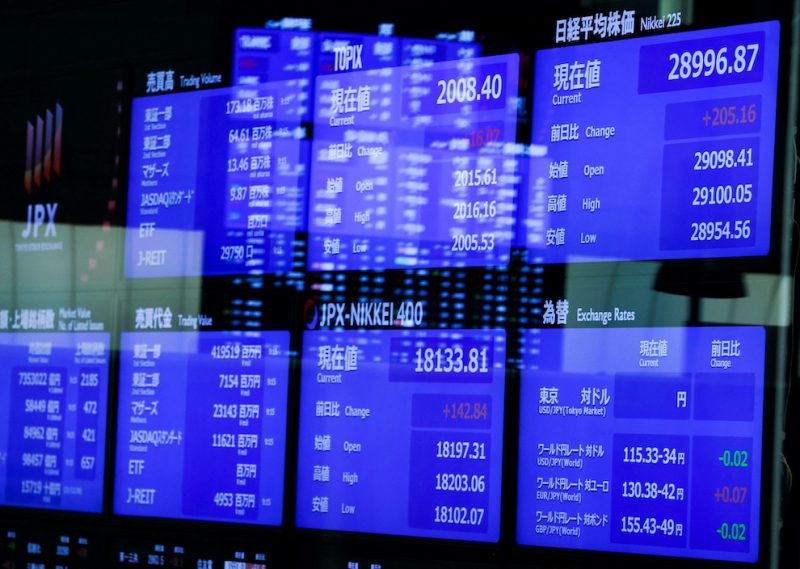Asian stocks remained bogged down at two-year lows on Wednesday as China’s continuing Covid crisis and a surging US dollar weighed on investors.
With Beijing signalling it has no immediate plans to ease its strict Covid curbs, amid an unrelenting dollar surge and a wobbling UK pound, traders’ mood across the region remained distinctly downbeat.
Japanese stocks ended flat after a bumpy trading session, with sliding tech companies countering gains in travel-related firms in a market that lacked direction ahead of this week’s key US inflation data.
Also on AF: Bonds at Distressed Levels Close to Record Highs: JPMorgan
The Nikkei share average opened down 0.18% and swung between losses and gains throughout the day, before closing down 0.02% at 26,396.83. The broader Topix lost 0.12%.
The biggest loser on the Nikkei was semiconductor equipment maker Tokyo Electron Ltd, which fell 4.4% amid ongoing confusion in the sector over the impact of export curbs announced by Washington last Friday.
And the rampaging dollar breached 146 yen for the first time in 24 years, prompting authorities in Tokyo to pledge it will take necessary steps in the foreign exchange market, if needed.
MSCI’s broadest index of Asia-Pacific shares outside Japan was down 0.5%, weighed heavily by China’s CSI300 index, which fell 1.4%. The Hang Seng Index dropped 0.8%, or 131.33 points, to 16,701.03.
The official newspaper of China’s ruling Communist Party warned on Wednesday that Beijing would persist with its Covid-19 policies to avoid losing control over local coronavirus outbreaks.
Mainland markets, though, staged a recovery and the Shanghai Composite Index rose 1.53%, or 45.71 points, to 3,025.51, while the Shenzhen Composite Index on China’s second exchange gained 2.53%, or 47.53 points, to 2.53.
Elsewhere across the region, Seoul’s KOSPI index was up 0.52% after the Bank of Korea raised rates by 50 basis points for a second time since July, as expected.
Indian stocks edged ahead with Mumbai’s signature Nifty 50 index up 0.62%, or 106.00 points, at 17,089.55.
Bank of England to Extend Bond-Buying
Globally, Britain’s bond market woes rippled across trading floors. After a torrid overnight session, sterling emerged from a two-week low, helped by a report the Bank of England (BOE) was prepared to extend its bond-buying programme beyond Friday, having previously spooked markets by threatening to withdraw support this week.
Damien Boey, chief macro strategist at Barrenjoey in Sydney, said the BOE was having to work harder than usual to keep the risk premium in the gilt markets under control.
Meanwhile, US inflation data on Wednesday and Thursday is expected to keep the Fed on an aggressive rate hike path.
Overnight, the S&P 500 and Nasdaq Composite fell 0.65% and 1.1%, respectively, though the Dow Jones Industrial Average managed to close up 0.12%.
Brent crude futures fell 46 cents, or 0.5%, to $93.83 a barrel by 0410 GMT. US West Texas Intermediate crude was at $88.81 a barrel, down 54 cents, or 0.6%.
It was the third straight dip in prices as investors worried about falling fuel demand and tightening Covid-19 curbs in China.
The International Monetary Fund on Tuesday cut its 2023 global growth forecast from 2.9% to 2.7%, warning that pressures from inflation, war-driven energy and food crises, and higher interest rates may tip the world into recession and financial market instability.
Key figures
Tokyo – Nikkei 225 < DOWN 0.02% at 26,396.83 (close)
Hong Kong – Hang Seng Index < DOWN 0.78% at 16,701.03 (close)
Shanghai – Composite > UP 1.53% at 3,025.51 (close)
London – FTSE 100 > UP 0.01% at 6,885.67 (0935 BST)
New York – Dow > UP 0.12% at 29,239.19 (Tuesday close)
- Reuters with additional editing by Sean O’Meara
Read more:
IMF Clips Asia Growth Forecasts on Surging Dollar, Covid Woes
Security, Covid Curbs Intensify Ahead of Beijing’s Congress
























